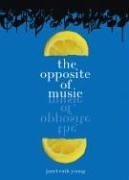Reviewed by Sally Kruger, aka "Readingjunky" for TeensReadToo.com
Billy describes how his father just seemed less interested in life at first, but then things deteriorated to the point of severe depression including weight loss, lack of communication, insomnia, and thoughts of suicide. THE OPPOSITE OF MUSIC tells the story of a family dealing with depression.
Billy's mother finally decides that her husband needs to seek medical help. Dr. Fritz is nice, but his attempts to help are frustrating. The first medicine he prescribes makes Billy's dad break out in disgusting sores. The next medicine causes paranoia and frightening dreams.
After failed attempts to use medicine to treat the depression, Billy, his mother, and his sister become determined to treat the problem themselves. Each researches the therapy they think would be best, and then they work together to cure dad. Some of their treatment involves diet, exercise, light therapy, aromatherapy, etc. Everyone sacrifices their own life to devote time to dad.
When it is obvious that their theories are not working and thoughts of suicide surface, it is decided that a new psychiatrist must be consulted. The new doctor recommends electroconvulsive therapy (ECT). Research tells Billy the therapy could be effective, but he also reads horrific tales of brain damage and torture. Will this help, or is his father's recovery a hopeless dream?
Janet Ruth Young offers an extremely realistic portrayal of depression and its effects on a family. It is definitely a book to recommend to teens living a life like Billy's. They will know that they are not alone.
Billy describes how his father just seemed less interested in life at first, but then things deteriorated to the point of severe depression including weight loss, lack of communication, insomnia, and thoughts of suicide. THE OPPOSITE OF MUSIC tells the story of a family dealing with depression.
Billy's mother finally decides that her husband needs to seek medical help. Dr. Fritz is nice, but his attempts to help are frustrating. The first medicine he prescribes makes Billy's dad break out in disgusting sores. The next medicine causes paranoia and frightening dreams.
After failed attempts to use medicine to treat the depression, Billy, his mother, and his sister become determined to treat the problem themselves. Each researches the therapy they think would be best, and then they work together to cure dad. Some of their treatment involves diet, exercise, light therapy, aromatherapy, etc. Everyone sacrifices their own life to devote time to dad.
When it is obvious that their theories are not working and thoughts of suicide surface, it is decided that a new psychiatrist must be consulted. The new doctor recommends electroconvulsive therapy (ECT). Research tells Billy the therapy could be effective, but he also reads horrific tales of brain damage and torture. Will this help, or is his father's recovery a hopeless dream?
Janet Ruth Young offers an extremely realistic portrayal of depression and its effects on a family. It is definitely a book to recommend to teens living a life like Billy's. They will know that they are not alone.





